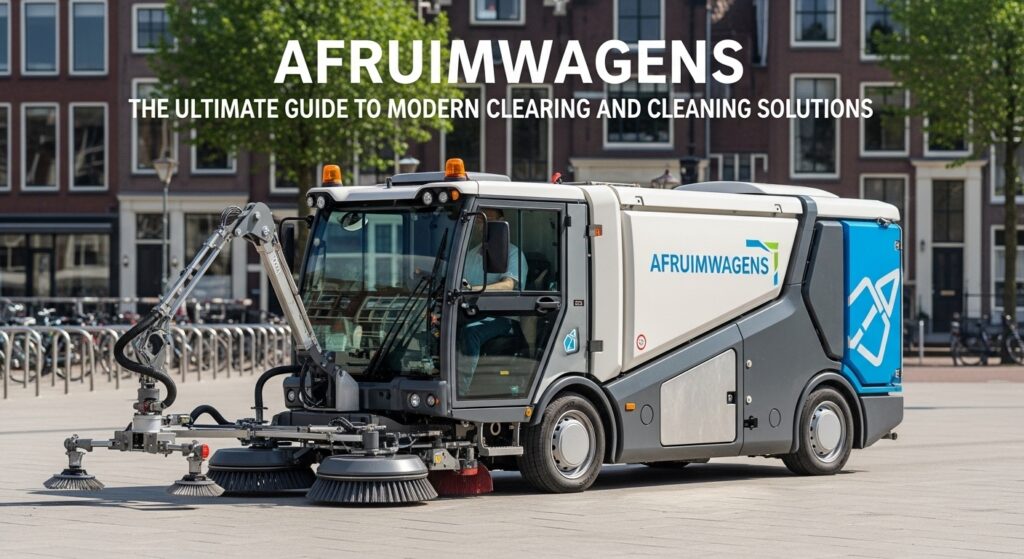Professional cleaning and clearing operations have evolved significantly over the past decade. Among the most innovative solutions to emerge are afruimwagens—specialized clearing vehicles that have revolutionized how businesses and organizations handle waste removal, site clearing, and property maintenance.
These versatile machines combine the functionality of traditional clearing equipment with modern efficiency standards. Whether you’re managing a construction site, maintaining commercial properties, or handling large-scale cleanup operations, understanding afruimwagens can help you make informed decisions about your clearing and cleaning needs.
This comprehensive guide explores everything you need to know about afruimwagens, from their core functionality to practical applications across different industries. You’ll discover how these innovative vehicles work, their key benefits, and how to choose the right solution for your specific requirements.
What Are Afruimwagens?
Afruimwagens are specialized clearing vehicles designed to handle various waste removal and site clearing tasks efficiently. The term combines “afruimen” (Dutch for clearing or cleaning out) with “wagens” (vehicles), reflecting their primary function as mobile clearing solutions.
These vehicles typically feature powerful suction systems, large-capacity storage compartments, and versatile attachment options. Unlike traditional garbage trucks or standard clearing equipment, afruimwagens offer enhanced maneuverability and can access areas that larger vehicles cannot reach.
Key Components and Features
Modern afruimwagens incorporate several essential components that make them highly effective for clearing operations:
Suction Systems: High-powered vacuum systems capable of handling various debris types, from leaves and paper to small construction materials.
Storage Compartments: Large-capacity containers designed for different waste categories, allowing for efficient sorting and disposal.
Hydraulic Arms: Extendable arms with various attachments for reaching difficult areas and handling different materials.
Filtration Systems: Advanced filtering mechanisms that prevent harmful particles from being released back into the environment.
Types of Afruimwagens
The afruimwagen market offers several distinct categories, each designed for specific applications and environments.
Compact Urban Models
These smaller units excel in densely populated areas where space constraints limit access. Urban afruimwagens typically feature:
- Narrow chassis designs for tight spaces
- Reduced noise levels for residential areas
- Enhanced maneuverability for complex routes
- Smaller capacity but higher frequency operation capabilities
Industrial Heavy-Duty Units
Designed for large-scale operations, industrial afruimwagens offer maximum capacity and power. Key characteristics include:
- High-volume storage compartments
- Powerful suction systems for heavy debris
- Reinforced construction for demanding environments
- Extended operational range capabilities
Specialized Environmental Models
These units focus on environmentally sensitive applications, featuring:
- Advanced filtration systems
- Low-emission engines
- Specialized attachments for hazardous materials
- Enhanced safety protocols and monitoring systems
Applications Across Industries
Afruimwagens serve diverse sectors, each benefiting from their unique capabilities in different ways.
Construction and Demolition
Construction sites generate substantial amounts of debris that require efficient removal. Afruimwagens excel in this environment by:
- Quickly clearing construction waste and debris
- Accessing confined spaces within building structures
- Separating different material types for proper disposal
- Maintaining clean and safe work environments
Property Management
Commercial and residential property managers rely on afruimwagens for:
- Regular maintenance of parking areas and walkways
- Seasonal cleanup operations
- Emergency debris removal after storms
- Maintaining aesthetic standards across properties
Municipal Services
Local governments utilize afruimwagens for:
- Street cleaning and maintenance
- Park and recreational area upkeep
- Public event cleanup
- Emergency response operations
Industrial Facilities
Manufacturing and processing facilities benefit from:
- Regular facility maintenance and cleaning
- Specialized waste handling for different materials
- Compliance with environmental regulations
- Improved workplace safety and organization
Benefits of Using Afruimwagens
The adoption of afruimwagens offers numerous advantages over traditional clearing methods.
Enhanced Efficiency
These specialized vehicles significantly reduce the time required for clearing operations. Their powerful suction systems and large storage capacities mean fewer trips to disposal sites and faster project completion times.
Cost-Effective Operations
While the initial investment may be substantial, afruimwagens typically provide excellent long-term value through:
- Reduced labor requirements
- Lower fuel consumption compared to multiple smaller vehicles
- Decreased disposal costs through efficient material handling
- Minimized equipment rental needs
Environmental Benefits
Modern afruimwagens incorporate eco-friendly features that support sustainability goals:
- Efficient fuel consumption reduces carbon emissions
- Advanced filtration prevents air pollution
- Proper waste separation supports recycling efforts
- Reduced noise pollution in urban environments
Improved Safety Standards
These vehicles enhance workplace safety through:
- Reduced manual handling of potentially hazardous materials
- Enclosed operator cabins with safety features
- Remote operation capabilities for dangerous areas
- Enhanced visibility and lighting systems
Choosing the Right Afruimwagen
Selecting the appropriate afruimwagen requires careful consideration of several factors.
Operational Requirements
Assess your specific needs by considering:
- Types of materials you’ll be handling
- Volume of waste typically generated
- Frequency of clearing operations
- Access limitations in your work areas
Environmental Considerations
Factor in environmental requirements such as:
- Noise restrictions in your operating areas
- Emission standards you must meet
- Waste disposal regulations in your region
- Environmental impact goals for your organization
Budget and Financial Planning
Consider both immediate and long-term financial implications:
- Initial purchase or lease costs
- Operational expenses including fuel and maintenance
- Training costs for operators
- Potential cost savings compared to current methods
Maintenance and Best Practices
Proper maintenance ensures optimal performance and longevity of your afruimwagen investment.
Regular Maintenance Schedule
Establish a comprehensive maintenance routine including:
- Daily pre-operation inspections
- Weekly cleaning of filtration systems
- Monthly hydraulic system checks
- Annual comprehensive servicing by qualified technicians
Operator Training
Invest in thorough operator training covering:
- Safe operation procedures
- Equipment capabilities and limitations
- Maintenance responsibilities
- Emergency response protocols
Performance Monitoring
Track key performance metrics such as:
- Fuel consumption rates
- Maintenance costs over time
- Operational efficiency measurements
- Safety incident records
Looking Toward the Future
The afruimwagen industry continues to evolve with technological advances and changing environmental requirements. Emerging trends include electric and hybrid power systems, autonomous operation capabilities, and enhanced connectivity features for fleet management.
These developments promise even greater efficiency, reduced environmental impact, and improved operational flexibility. Organizations investing in afruimwagen technology today position themselves to benefit from these future innovations while immediately improving their current operations.






